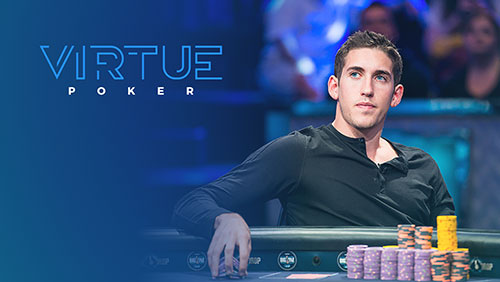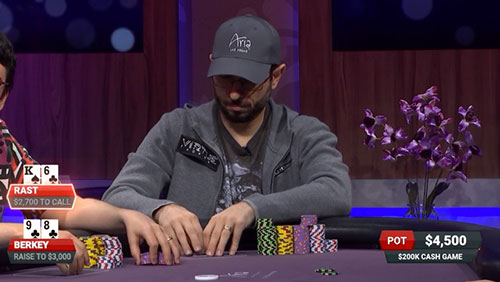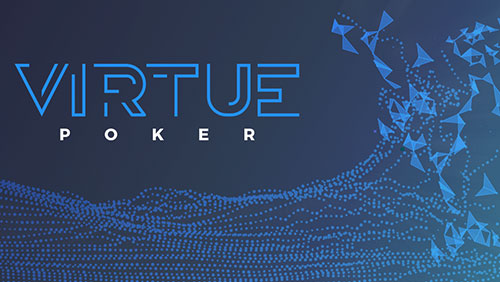Lee Davy sits down with the Ryan Gittleson, Head of Business Development and Marketing, for Virtue Poker, to learn more about the innovative new poker room, why Dan Colman and Brian Rast have jumped on the bus, and how this particular bonehead can learn more about blockchain.
*To download this audio, right click and save link as*
Goa becomes the first cashless state in India.
Sweden wants to become the first cashless country.
I know that cash is dying. My banking experiences are woeful. Online gambling transactions can be convoluted and crushingly cumbersome.
But I’m still afraid to take the plunge and exchange some of the numbers in my bank account, for numbers in a digital wallet. Here are the primary reasons for my fear. It’s new. It’s my money. I don’t want to lose it. And I don’t understand it.
Regular readers of this website know that there is a strong feeling that cryptocurrency will become the king of gambling currency. It’s high time I learned to understand it, but each idiot’s guide I trawl through reads like the instructions manual for the Star Trek Enterprise engineering department.
So what better way to shake this feeling than to speak to one of the founders of Virtue Poker, an online poker room, set to become the safest place to play online poker room in the world. A startup with that much bite, Dan Colman sent an email to the owners asking how he could get involved.
What follows is an abridged version of a 60-minute conversation I had with Ryan Gittleson, the Head of Business Development and Marketing for Virtue Poker. Stop reading, and instead listen to the interview, it’s much better.
What has changed since our chat in December?
“We have grown our development team to five full-time employees. We added two part time consultants. We’ve solidified the Justice System. We have met with gaming regulators across the EU to introduce them to the platform, and the conversations have gone well. We incorporated in Gibraltar, so we are a company now. Yesterday, we added Dan Colman and Brian Rast to our team as advisors for the project. And we received legal feedback on our token model and are ramping up for our token launch next month.”
 Why Dan Colman and Brian Rast?
Why Dan Colman and Brian Rast?
“We have the technology side down, but we don’t have the industry expertise or our pulse to the industry as Dan or Brian does. We were looking for well-respected pros who are passionate about cryptocurrency. Dan reached out to us, and I was introduced to Brian by a mutual friend. It was interesting to see their enthusiasm for the space, they are owners of cryptocurrency, but want to learn more about our business, and so they were perfect for us.”
Are you marketing to people who are knowledgeable about cryptocurrency, or do you want to reach a broad range of individuals immediately?
“The growth of the distributed server processing system Ethereum community and general interest in blockchain technology means there will be a lot of people who get this right off the bat. But I see Virtue Poker as a bridge to mainstream, adoption and understanding of blockchain technology.
“Think of a bank. They have a ledger of who owns what and how much. When one person moves money to another the bank updates the ledger, reduces one account by the transfer amount, and adds it to the other. The bank will go through with that. There is a trust element they will do it properly, they won’t get hacked, and that their data will be of the highest integrity.
“Blockchain takes this concept of a ledger, decentralises it, and replicates it across thousands of nodes around the world. This is what Bitcoin is. It’s a ledger of who owns what and how much, and there are all of these nodes and computers around the world that have the same copy of that ledger.
“So when one person wants to move one Bitcoin to another, what happens is it’s broadcast to this global network of computers who are all competing to verify this transaction. Think of it like solving a cryptocurrency puzzle. The first to get it right gets a piece of the Bitcoin as a fee. That transaction is included with other transactions of a similar sort as a block. That’s added to the blockchain or this ledger, and all of these computers all over the world automatically update to the same as that ledger. That’s how Bitcoin works. If 50% of nodes go offline tomorrow, the ledgers are still in tact.
“Ethereum took this concept of a decentralised ledger and instead of including in a transaction the ability to move money from A to B you can include computer code in that contract.
“On Virtue Poker the computer code we insert creates a short term escrow account. The players on a table send their Ether to this table contract. It holds it in escrow stored on the blockchain. Included in that contract are the customer parameters of the game. Included in that contract is a chip counter understanding every player’s stake. At the end of a hand, all of the players submit a transaction to update the stakes in that contract accordingly. For a Sit n Go when all the player’s stakes reach zero except one the contract know to begin paying people out.
“The players have a wallet. The only money at risk is the money sent to the table contract. When the game is over the money is returned to the digital wallet. One of our core value propositions is removal of player deposit risk. We are never in control of that money.”
We trust banks without understanding how they work; I guess we have to take that same leap of faith to use cryptocurrency?
“I was watching Mr Robot Season 1 when I first heard about blockchain technology. The financial crisis that occurs when these records are deleted on the show, that’s analogous to real life, and one of the core value propositions of a blockchain is there isn’t a single point failure. You can’t go for one guy, one node, one computer and take this offline. You would have to get all the computers that are mining Ethereum around the world and take them all down simultaneously. It’s a new paradigm. The idea of decentralisation, this core tenet of this industry, it took me 4-6 months to fully wrap my head around it, so don’t feel concerned that you don’t get it right off the bat.”
What does a digital wallet even look like?
“The best way to think of a wallet as private key and public address. Think of the public address as a postal address. Anyone can send things to you. And your private key is the only thing you can use to unlock that, in this case, your money. It’s called the public and private key pair. The wallet on your phone is a private key kept on your phone, or there can be one on your computer.
“Other hardware wallets like the Ledger Nano, your private key is held on a device. It’s more secure because it’s not connected to the Internet, but if you lose that key, it’s like losing a key to your apartment and losing your key forever. A locksmith can’t help you. You lose that money forever. The only way you can recover that private key is using the recover phrase you created when you created your wallet. It’s a string of words like the cat walked along the river. You have to keep pieces of paper with recovery keys for all the wallets you have. It’s fascinating. It shows we are in the early stages of this technology. In the future, people will be using blockchains, and they won’t even realise it, in the same way, we use the internet and don’t think about it. Back to Virtue Poker. The first users will be people who are interested in this technology, but as part of our roadmap, we aim to broaden the appeal to all individuals who like poker irrespective of their knowledge of this type of currency and software.”
Do you think you need to dumb the communication down further to reach more people?
“I wrote most of the white paper working with my development team and tried to describe it to someone who is non-technical. Part of the challenge of Virtue Poker is taking these value propositions, and engaging in the form of content marketing that communicates to a broader audience.”
An example from the white paper – Using a peer-to-peer, cryptographic shuffling protocol called Mental Poker, all players seated at a table are involved in card shuffling, and reach consensus at the end of each hand using a Byzantine Fault Tolerant consensus mechanism – in English, please?
“Ok, I didn’t do a good job of dumbing that down. Essentially, to put it into English, the difference between Virtue Poker and PokerStars – let’s take the RNG. In real life you see someone shuffle the deck and you trust it’s fair. In the digital world, you can’t see it. PokerStars have an RNG stored in a server stored in some foreign country. This source of randomness is used to shuffle the deck of cards for all of the games on the platform. They have it tested to certify that it’s fair once every five years and there is no oversight after that. There is an element of trust. If I can’t see it how do I know it’s fair?
an element of trust. If I can’t see it how do I know it’s fair?
“For the professional player, as long as they are winning money, they don’t care about these things. The recreational player who suffers a bad beat with a two outer on the river – there is this perception of doubt. At Virtue Poker we want to address that audience, and have them sleep safely knowing the games on Virtue Poker are fair. Instead of having one server that powers all of the decks in the game, every player has an RNG built into their computer on our client that is involved in shuffling the deck of cards. All players are included in a given hand with the shuffling of that deck of cards. Even if all of the players you are playing with were colluding and tried to hack their client and tamper with the deck as long as your computer shuffles that deck the game is fair and random. You only need one correct shuffle. That’s called Mental Poker, and we have incorporated it in Virtue Poker. It’s never been done before. We have spent two years building this out to answer the question, is online poker fair?”
So you are positioning yourself as the safest place to play poker in the world, live or online.
“That’s part of the thought process behind our name: Virtue: high integrity. That’s the brand we are trying to build. PokerStars have 15-years experience. They don’t have malicious intent, but they don’t have strong brand loyalty with their customers. People play on PokerStars because they have to. PokerStars is just interested in improving their profit margin. Our goal is to provide the safest and most trusted online poker platform, to listen to the players, create a product for them, and make some money in the process.”
How are you going to communicate with your audience?
“One idea is having a dedicated forum. Like 2+2 but for conversations on Virtue Poker. Another important point is problem gambling. We want to address those concerns and create mechanisms where people can lock themselves out of their client if they have a problem. I was reading a post about Americas Cardroom where a player wanted to lock himself out of his account, and they allowed him in a few days later. One of the things I will say. It’s easy to say these things. It’s going to be a lot of work. But this is our focus.”
Why the Ethereum blockchain and not the Bitcoin blockchain?
“It’s a more comprehensive programming language; you can do more with it. I would liken Bitcoin to a pocket calculator, and Ethereum is a Macbook Pro. Ethereum has taken the best of Bitcoin and built upon it to make it better. We also have to think about scalability. Blockchains right now are really slow. I think Ethereum can process in the realm of 40 transactions per second, and Visa can process 40,000 transactions per second. Ethereum has certain things in their roadmap to improve this protocol. The first blockchain that achieves scalability will be the one everyone uses, and I think Ethereum will be the first, and it’s not only me. The Ethereum community is the fastest growing and largest development community globally. When I started working on this project, there was 500-1000 on the Etherurm subreddit now there are 120k. You have to look at where the developers are, and where the apps are being built, that’s the blockchain that’s going to win. I could have an operating system that’s better than iOS and Android, but if no-one builds any apps on top of that, it’s going to be a waste of time.”
Talk about your plans to build a decentralised poker network using this technology.
“We have this new solution, untested and unused. Let’s build a brand on top of this. Let’s show the integrity of this solution, get customers and leverage that into white labelling and licensing that software to other people around the globe. For example, let’s say Mexico or Brazil regulate online poker, and they are only going to give five licenses out to Mexican and Brazilian based companies, that means we can’t operate in that market, but we could approach them to partner. We could license our software to them, and it allows them to tap into our liquidity. That’s our growth strategy and being able to combat the rise in the regulation of online poker. If a country chooses not to legalise it, we can operate as a B2C brand. If they do regulate, we can partner with the licensees and benefit, and set us up for success either way.”
What is your stance on poker bots and third party software on Virtue Poker?
“My opinion on third party software, like things that allow bum hunting is bad for the industry. On the contrary, if you all use a HUD I see that as creating a level playing field. If you created a built in HUD, then everyone has access to the same information. The third party software tools that allow you to sit next to a losing player comes from screen scraping. We are investigating a potential solution to that problem. It’s not good for the industry to distort a playing field even more.
“With regards to poker bots, that’s an irreversible trend. What we want to do on Virtue Poker is have a bot v bot arena, a bot v human arena, and a human v human arena. If you try to use a bot in a human arena, we will discover that and ban you from the client. Another thing you can do is change the game. Ever heard of short-decked poker, 34 cards, and no poker bot has solved that game. So innovating the game types is an area of opportunity for us.”
What is the name of your cryptocurrency and will you have an ICO?
“We are doing our token launch next month. It’s called Virtual Player Points (VPP). You can wager with it, you can stake it to become a justice, and you can use it to access special tournaments. We are also going to potentially use it as a rakeback system to reward people for using our platform.”
Towards the end of the interview, I got a little lost when Ryan was trying to explain how the Justice System worked. I kept thinking about Wonder Woman’s legs and couldn’t focus. Rather than screw the interview up by continuing to ask Ryan Why? like a child, I asked him to explain it in more detail and here is Ryan’s explanation of the Justice System.
In order to combat collusion and cheating, Virtue has developed the Justice System. Justices are non-playing peers that are assigned to poker tables who provide security and protection to players on the Virtue Poker network and in exchange receive fees from players. Justices are assigned to tables on the Virtue Poker network, and every few hands, are randomly reassigned to another table. Justices can be thought of as validator nodes on the Virtue Poker network, signing each transaction for every hand on the platform and submitting hand histories for storage. The functions described below are automated: there is no manual oversight needed for a user to run a Justice node. And in return for providing this service, Justices can earn fees from Virtue Poker.
Core Functions of Justices
Justices provide three core functions to the Virtue Poker network:
Dispute Resolution
In the rare instances, two peers at a table disagree as to the “state” of the table at the end of a hand or a game, a Justice can resolve the dispute in real-time and award the winner the pot.
Data-Feed
 Each Justice submits each action of every hand for storage so that hand histories can be stored. This is a both required by gaming regulatory bodies and ensures essential services such as collusion detection, bot detection, and multi-accounting identification can be conducted.
Each Justice submits each action of every hand for storage so that hand histories can be stored. This is a both required by gaming regulatory bodies and ensures essential services such as collusion detection, bot detection, and multi-accounting identification can be conducted.
Partial Storage of Player Encryption Keys
Justices will store a decryption key for the players at the table. The “Dropped Player Problem” for Mental Poker is defined as when a player drops out of a hand prior to a hand being completed. This is problematic, as all players must share encryption keys for community cards to be revealed and for a hand to be completed. Using Shamir’s Secret Sharing, each player’s keys can be encrypted and split amongst all players plus the Justice. If the player drops, the Justice can request the pieces from each player and decrypt the assembled pieces so that the hand can be completed.
A Justice node on Virtue Poker can be activated by downloading the Justice client to a machine, opening the application and activating the Justice. Again, running a Justice requires no manual oversight, it can be thought of as a software program running in the background on your computer
An infographic about the Justice System can be found here.
The white paper for Virtue Poker is right here.
Am I any the wiser?
I don’t think I am.
The more I talk about blockchains, digital wallets, and cryptocurrency, the more it becomes apparent that the only way to learn is to get involved. In doing so, you are taking action, and there is no better form of learning than taking action, making mistakes, and then learning from those mistakes.
It cannot be as difficult as it sounds.
If it is, then it’s going to be a tough slog for these pioneers.
During the interview, Ryan said that it doesn’t matter if you create a better OS than iOS or Android if nobody builds apps on your OS. I would extend that to include, it doesn’t matter how brilliant your online poker room is if everybody is scared of using it because they don’t understand all the jargon.